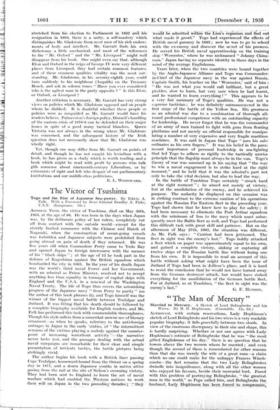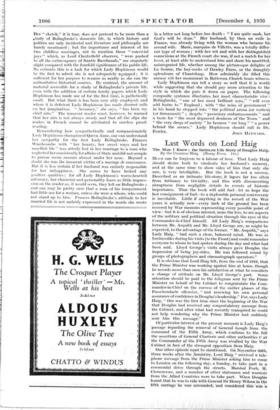" The Man of Mercury
7>
Married to Mercury. A Sketch of Lord Bolingbroke and his Wives. By M. R. Hopkinson. (Constable. 12s. 6d.) ALTHOUGH, with certain reservations, Lady Hopkinson's sketch of Lord Bolingbroke and his two wives is a very readable popular biography, it falls gracefully between two stools. In view of the enormous discrepancy in their size and shape, this is hardly surprising. Whether or not one agrees with Lady Hopkinson's estimate of Bolingbroke that he was " the most- gifted Englishman of his day," there is no question that he towers above the two women whom he married ; and even though the second of them is remembered for other reasons than that she was merely the wife of a great man—a claim which no one could make for the unhappy Frances Winch- combe—the fact remains that the two Lady Bolingbrokes dwindle into insignificance, along with all the other women who enjoyed his favours, beside their mercurial lord. Faced with this problem of portraying. Bolingbroke, " the greatest man in the world," as Pope called him, and Bolingbroke the, husband, Lady -Hopkinsan--hes- been forced -to compromige, Her " sketch," it'is true, does not pretend to be more than a ;Andy of Bolingbroke's domestic life, in which history and politics are only incidental and literature and philosophy are barely mentioned ; but the importance and interest of his two childless marriages, not to mention those " convivial joys " which, as Lord Chesterfield observes, " were pushed to all the extravagancy of frantic Bacchanals," are singularly slight compared with the fourfold significance of his public life. To estimate this is a task for which Lady Hopkinson would be the first to 'admit she is not adequately equipped ; it is sufficient for her purpose to resume_ as neatly as she can the authoritative historical sources. By contrast, the amount of material accessible for a study of Bolingbroke's private life, even with the addition of certain family papers which Lady Ilopkinson has made use of for the first time; is pathetically small. But what there is has been very ably employed, and where it is deficient Lady Hopkinson has made discreet calls on her imagination. " Accuracy," she says, " has been my chief aim." The innocent reader must, however, be warned that her aim is not always steady and that all the slips she makes in French cannot be attributed to careless proof- reading.
Remembering how sympathetically and compassionately Lady Hopkinson championed Queen Anne, one can understand her sympathy for the first Lady Bolingbroke. Frances Winchcombe with " her beauty, her sweet ways and her unselfish life " was utterly lost in her marriage to a man who neglected her consistently for affairs of State and did not scruple to pursue mean amours almost under her nose. Beyond a doubt she was the innocent victim of a mariage de convenance. But it is less certain if her husband was entirely responsible for her unhappiness. She seems to have lacked any positive qualities ; for all Lady Hopkinson's warm-hearted advocacy, her character and personality leave as little impres- sion on the reader as, it would seem, they left on Bolingbroke ; and one may be pretty sure that a man of his temperament had little use for a woman, unless she were a whore, who could not stand up to him. Frances Bolingbroke's attitude to her married life is not unfairly expressed in the words she wrote in a letter not king before her death : " I am quite sunk, but God's will be done." Her husband, by then an exile in France, was already living with the woman who became his second wife. Marie, marquise de Villette, was a totally differ- ent type of woman ; with her wit and with her diitinguishel connexions at the French court she was, if not a match for her lover, at least able to understand him and share his unsettled, unintegrated life, whether among the picturesque delights of La Smirce, the hay-cocks of Dawley Farm, or the draughty splendours of Chanteloup. How admiriblS, she 'filled this uneasy role her monument in Battersea Church bears witness.
Lady Hopkinson can tell a story so well that it is worth while suggesting that she should pay more attention to the style in which she puts it down on paper. The following composite sentence illustrates her, most characteristic vice : Bolingbroke, " one of her most brilliant sons," " will ever add lustre to " England ; with " the reins of government in his hand he stepped into " the political arena (or vortex) (or firmament) " ; despite " pecuniary embarrassments " and a taste for " the most depraved denizens of the Town " and " the very dregs of society " he became " ere king " " a power behind the scenes." Lady Hopkinson should 'call in Dr. Fowler.
JOHN HAYWARD.





















































 Previous page
Previous page